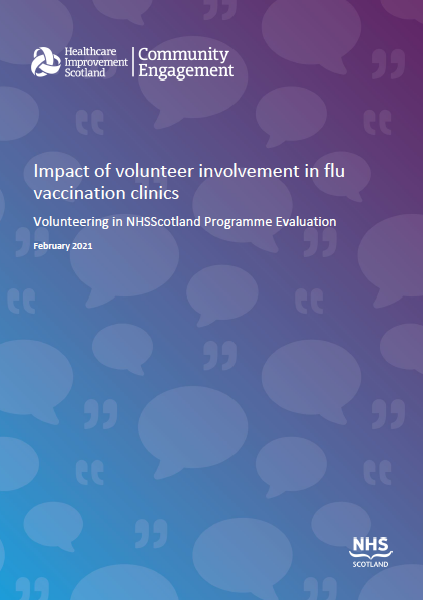This report summarises the impact of volunteers in flu clinics.
Volunteers play a hugely important role in NHS Scotland, giving their time and energy to help others. They are playing a valuable part in the response to the COVID-19 pandemic and in normal times there are around 6,000 directly engaged volunteers across all 22 health boards. We are hugely grateful for their support of patients and NHS staff alike.
Volunteering brings enormous benefits and enjoyment, not only to beneficiaries, but to communities, staff and to volunteers themselves. We know that – among other things – volunteering increases social and civil participation, empowers communities, and reduces loneliness and isolation. It can also improve mental and physical health, support the development of job and life skills, and foster a greater sense of belonging.
One of the key remits of the Volunteering in NHS Scotland programme is to support safe, effective, person-centred and sustainable volunteering across NHS Scotland. This includes the spread of innovative volunteering roles and best practice. As part of our work, we carried out on an evaluation with the aim of reviewing the roles volunteers can play in flu vaccination clinics and consider the impact on volunteers, clinical staff, patients and volunteer managers.
Thank you to all those staff and volunteers who participated in the evaluation during times of such pressure.
Key findings
Volunteers have added significant value to the delivery of flu vaccination programmes, contributing to safety, the smooth operation of clinics and positive experiences of patients.
The experience of staff, volunteers and patients was so positive that all reported that they would involve volunteers in future vaccination programmes, including the COVID-19 vaccination programme.
Partnership working, within NHS Scotland and with the third sector, played a key part in the well-managed mobilisation of volunteers. Of particular note was when staff with specialist skills in volunteering and volunteer management were involved in the planning and delivery of volunteering to support clinics.
Consistency in good practice in volunteer management, clear processes and communication plans were identified as some areas which would benefit from improvement.
Recommendations
- A strategic approach to formulating plans for volunteering in large-scale vaccination programmes, providing a framework for NHS boards and health and social care partnerships would be of benefit.
- The Volunteering in NHSScotland programme should develop guidance and resources for NHS boards and health and social care partnerships on involving volunteers in large-scale vaccination programmes.
- Modelling for volunteer numbers based on location, venue size, patient numbers, appropriate shift length and roles should be considered in advance of involving volunteers.
- Regardless of delivery model, the staff member responsible for the supervision of volunteers should have a clear understanding of volunteering best practice, and on the role and boundaries of the volunteer. It is best practice to provide orientation and daily support to volunteers and, where the supervisor is not an experienced volunteering professional, should have access to a local volunteering contact (NHS or Third Sector Interface) to provide support as necessary.
- NHS boards and health and social care partnerships should consider working in partnership with the third sector to support the delivery of volunteering in large-scale vaccination programmes.
- Volunteers in patient-facing roles in vaccination programmes should be offered the COVID-19 vaccination as outlined in the Scottish Government's COVID-19 vaccine deployment plan 2021.

